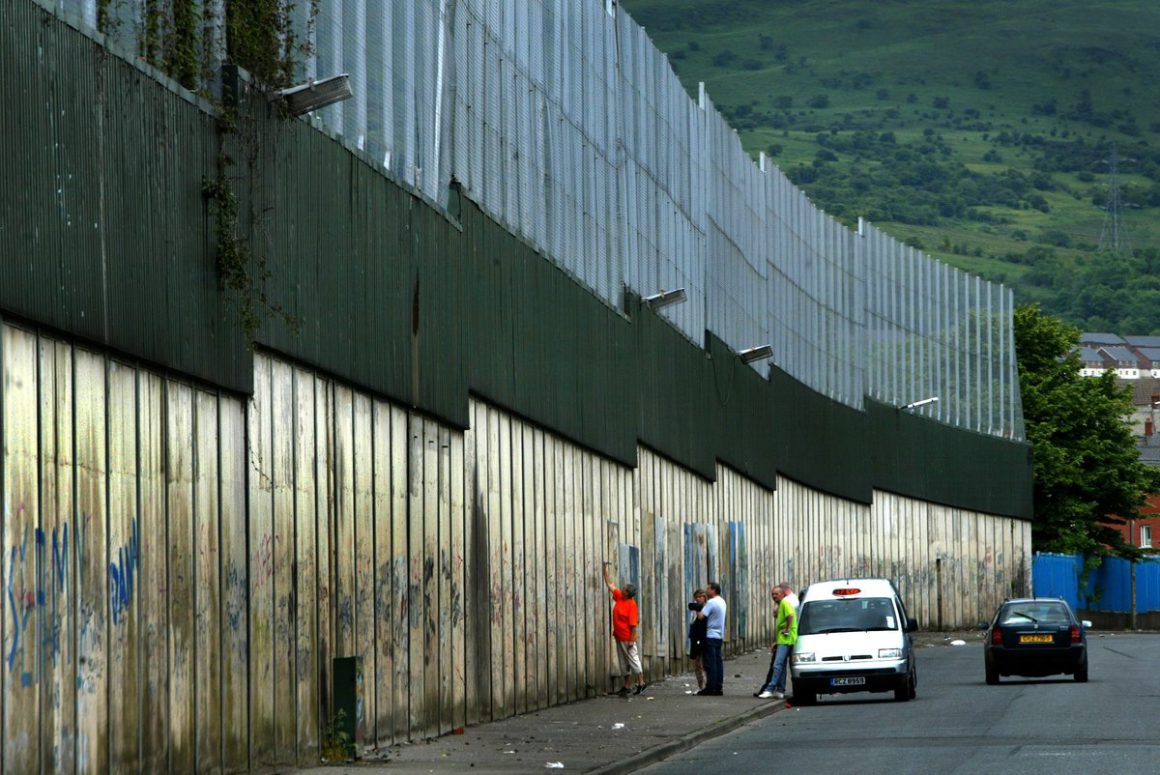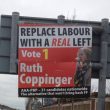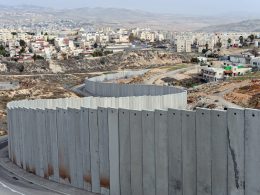Over the last two decades, in the aftermath of paramilitary ceasefires in 1994 and the signing of the Good Friday Agreement in 1998, it has been argued that the foundations have been laid to overcome sectarian conflict and division. KEVIN HENRY explains why a just and democratic solution to the national question on this island is ultimately unattainable without a fundamental break with capitalism.
The political life of Northern Ireland is one riddled with division and crises. The current crisis in Stormont exposes once again the fragile nature of the ‘peace process’. This process has failed to resolve any of the key issues facing working class people in Northern Ireland. A growing section of people are concerned about the future of Northern Ireland, with one opinion poll showing that under 45% agree there will be lasting peace in Northern Ireland.
When we do have ‘agreements’, such as the recent Stormont House Agreement, they are largely agreements to disagree, to kick the can down the road in terms of the fundamental problems of sectarian division such as flags, parades and dealing with the past. The parties in the Assembly are capable of agreeing massive attacks on working class people: the destruction of jobs and services and cuts in taxes for the rich, of course. In this sense at least, all the main parties are cut from the same cloth. They are tied to a right-wing ideology that wants to see the Northern Ireland economy ‘rebalanced’.
Marxist method
Socialists cannot simply wish away the complication of the national question and sectarianism. As the Russian revolutionary, Leon Trotsky said, “the national struggle cannot be suspended by bare reference to the future world revolution”.[i] We cannot ignore the aspirations and fears of people in trying to find a solution to these complicated questions. However, It is a major mistake, and a mistake that many on the Left make, to take a one-sided approach to this issue. It is not good enough to simply echo demands from one side of the sectarian divide and give them a socialist veneer – for example the Socialist Workers Party’s view that we need to put forward an “alternative vision of a united Ireland”.
For socialists, our starting point for analysing and offering a solution to the national question is an absolute focus on the interests of all working class people, not that of any ‘nation’. This is summed up in the slogan of the Socialist Party, “for workers unity and socialism”. This slogan encapsulates the Socialist Party’s forward looking and ultimately optimistic perspective. Our position is that the only class which is capable of ‘solving the national question’ in Ireland is the working class and that a solution can only be found through the struggle for a socialist society.
Historically, Marxists have been key advocates of the right to self-determination. They put forward this slogan in order to fight for democratic rights, but also to separate workers from nationalism. It should never be applied in a way that actually works to bolster divisions. In the context of Ireland today, the slogan of the right of nations to self-determination does not advance understanding or clarify the rights of either Catholics or Protestants. Instead, socialists have to adopt a series of negative demands: against national oppression, against coercion and against the denial of rights.
Good Friday Agreement: failed to deliver
Under the structures established by the Good Friday Agreement (GFA), it is assumed that everyone belongs to one or other of two mutually exclusive communities. In reality, the GFA acts to institutionalise sectarianism rather than overcome it. Under capitalism, the result is the sharing out of poverty and unemployment.
Many Protestants feel that they are often prevented from expressing their cultural identity. In working class areas, a general sense that “we have no more to give” has developed. A sense of uncertainty about the future, even the future of the union with Britain, is growing. This will be exacerbated if Sinn Féin is a key player in a future government in the south. The flag protests acted as a lightening rod for this discontent. Many young Protestants are becoming foot-soldiers for Loyalist paramilitary groupings, precisely for this reason.
At the same time, many Catholics believe that they are subject to continuing sectarian discrimination. While naked sectarian discrimination is largely in the past, there is an objective basis to such beliefs. Repression is still meted out in Catholic areas, though in a more targeted fashion than in the past. For historic and geographical reasons, and because of the residues of sectarian discrimination, there are still differences between the two communities in economic terms.
Repression is not one-sided however. More than 600 young Protestants were arrested during the flag protests, for example, and many received prison sentences. Nor is poverty confined to Catholic communities. Both communities have suffered from austerity. The sharpest form of discrimination practiced today is in fact class discrimination, and both the Protestant and Catholic working class are its victims.
Among a layer of Catholics there is a sense that history is moving in their direction. This sense is more subdued than at the early days of the peace process however, and the most downtrodden and alienated Catholic youth draw an entirely different conclusion and some have looked to various dissident republican organisations for answers.
The reason that each community feels aggrieved, and draws opposite conclusions, is that there are genuine grievances on both sides. The real problem is that the peace process has failed to deliver for the working class, whatever their background. It has failed to overcome the underlying causes of conflict because, under capitalism, genuine peace and real economic advancement for working people is not possible.
Despite all the talk of an economic ‘peace dividend’, the living standards of most working people in Northern Ireland have not improved. In fact, as the Northern Ireland Peace Monitoring Report said recently, “this is a lost generation economically.” The future for the working class and young people is bleak. While in Britain youth unemployment is going down, here it remains at record levels. The prospect of further austerity will have a disproportionate effect on the Northern Ireland economy, reliant as it is on the public sector. In fact the Northern Ireland economy is still in recession according to PricewaterhouseCoopers.
The relative ‘peace’ is maintained by dozens of permanent ‘peace-lines’, thousands of armed police and the local enforcement activities of paramilitary groups interested primarily in control of ‘their’ areas. When all this is insufficient, then temporary peace-lines are thrown up and hundreds of extra police are drafted in. Over 150 people have died since 1998 and there were 1601 shooting incidents and 1114 bombing incidents between 2001 and 2012. In many ways, all that has been achieved is an ‘acceptable level of violence’, to borrow a phrase from 1970s Home Secretary, Reginald Maudling.
One of the key sectarian battle grounds, alongside the issues of parades and flags, is through various interpretation of the past. This can take the form of sectarian clashes when one sectarian force or another tries to commemorate an event through demonstrations, memorials or the even the naming of play parks.
Socialists support the right of all to remember their dead, but it is more important that a spotlight is shone on the past. A genuine examination of the past would expose the role played by all of the sectarian parties, paramilitary groups and individuals. It would also expose the role of the state, which employed vicious repressive methods for decades. It is important to set out the record of all the contending forces.
International examples
On a global scale, and importantly in a number of countries across Europe, the national question has re-emerged as a significant issue in the recent period. This is a result of the international crisis of capitalism and the failure of the workers’ movement to challenge for power over an extended period of decades. In 1990’s after the collapse of the Stalinism, a triumphant capitalism believed it could resolve the national question across the globe. It has not succeeded in Northern Ireland. Instead, it has built a “peace process” based on not resolving the fundamental problems of division and oppression, but on ensuring the maintenance of the economic status quo.
In recent years capitalist commentators have held up the Northern Ireland ‘peace process’, not just as a success, but as a model for other parts of the world. Those involved in the “peace process” here have travelled across the world – to the Basque country, Iraq, Palestine, Columbia and Sri Lanka, to offer advice on various conflicts and other peace processes. The truth however is that the ‘peace process’ here is based on a model that has already failed and has resulted in a return to conflict, often in a more nakedly sectarian form.
The ‘solution’ for Northern Ireland was based on a model known as, “elite accommodation based on a consociational model”. The model has four pillars: “First, political elites representing all significant segments of society must participate in some form of grand decision-making coalition. Second, a mutual veto must exist, allowing elites of each group to challenge decisions detrimental to their particular groups. Third, proportionality must be the standard principle of political representation, civil service appointments, and the allocation of public funds. Fourth, each segmental group must be allowed to run its own internal affairs”.[ii]
By ‘elites’, the model means literally a handful of people, or even single individuals, representing communities. The elite reach an accommodation – that is they agree to carve up power and resources – and the communities they supposedly represent live separately. The model presupposes no coming together of people on the ground and holds out no possibility of such a coming together in the future.
For some decades this was the model implemented in Lebanon. After Lebanon achieved independence from France in 1943, there was an agreement between the largest Christian and Muslim groups which set a fixed ratio of seats in the parliament and guaranteed that the President would be a Christian and the Prime Minister a Sunni Muslim. It was later adapted and the post of Speaker of the Parliament would go to a Shia Muslim. Demographic changes, particularly the numerical growth of the Shia – the most oppressed of the main religious groups – eventually eroded the basis of this accord. Eventually in 1975, it all came to pieces in the civil war that lasted for 15 years.
Border Polls
Socialists have to raise a similar warning about the current ‘peace process’. There can be no lasting solution that relies on sectarian leaders without any coming together of people in working class communities. Nor can there be solution based on coercion of one community by another. This is a recipe for a return to sectarian conflict, rather than a real solution.
An example of this is the call from Sinn Féin for a referendum on the border before 2020. Some figures in the DUP have surprised Sinn Féin by suggesting that it might agree to such a border poll.
For Sinn Féin, this is about reassuring its base that its long term aim of a united Ireland is still on track. It is conscious that raising the issue of a border poll will increase sectarian tension. It also knows that a prolonged campaign on the issue will help to divert attention from the part it plays in the cuts government at Stormont. When the idea of a border poll was first raised the Socialist Party argued:
“Sinn Féin’s approach is based on the mathematics of sectarian division and the logic of capitalist economics. While it pays lip service to the idea of ‘persuading’ Protestants of the benefits of a united Ireland it makes no bones of its bottom line: Catholics will sooner or later vote them into a united Ireland regardless of their wishes.
“For several years, Sinn Féin and nationalist commentators have been eagerly awaiting the publication of the 2011 census results. In 2011 48% of the population were either Protestant or brought up as Protestant, a drop of 5% from the 2001 census. 45% of the population were either Catholic or brought up as Catholic, an increase of 1%. These figures demonstrate that the demographic balance is shifting, but more slowly than expected.
“Unionists point to a recent opinion poll for the BBC which show that a clear majority of the population of the North, 67%, are in favour of remaining in the UK and that only 35% of Catholics state clearly that they would vote for a united Ireland in a referendum. 38% of Catholics say they would vote to stay in the UK. For the nationalist parties the poll raised issues, with 56% of SDLP voters saying they would vote to remain in the UK and 23% of Sinn Fein voters also stating they would vote to remain within the UK.
“For Sinn Féin and the SDLP, the issue of a border poll is a simple one of ‘democracy’. In their view, if Northern Ireland has a Catholic majority then the border can be voted away. They hold that demographic change is inexorably moving in one direction. At that point, Protestants should ‘accept reality’ and ‘move on’.
“This line of argument displays a profound amnesia. For three generations Catholics in Northern Ireland refused to recognise the ‘democracy’ of Northern Ireland. In their view, they had been coerced into an artificial statelet and they would not bow down and accept this situation. They were perfectly justified in this stance. Why now do nationalist and republican politicians assume that Protestants must accept the formal democracy of losing their majority position in the North which, on the basis of capitalism, raises real fears among working class Protestants that they will become a disadvantaged, discriminated-against new minority community?”[iii]
It is utopian and highly dangerous to believe that the national question in Ireland can be resolved on the basis of a border poll. Socialists have to stand in opposition to such a referendum and any attempt to coerce. We oppose both the continued coercion of Catholics in remaining in Northern Ireland against their will, but also the coercion of Protestants into a capitalist united Ireland. Instead we propose a solution which meets the aspirations of all, a solution which is only possible on the basis of a socialist transformation of society.
Workers’ movement key
There are those who wish to reduce the ‘Troubles’ and the ‘peace process’ to the various contending forces of loyalism, republicanism or the British state. There was another force, which acted to stop a slide into an all-out civil war in the past and which has the latent power to transform society – that of the working class.
The working class has mainly placed it stamp on events through the trade union movement, which has a unique role to play in challenging sectarianism, as the only mass organisation that unites workers from both communities to fight for their common interests. At key points during the course of the ‘Troubles’, the trade union movement was able to mobilise ordinary workers in united action – such as demonstrations, walk-outs and strikes – in response to sectarian threats or attacks and to isolate sectarian forces.
At the start of the Troubles, trade union shop stewards took action in the shipyards to oppose intimidation of workers and formed ‘peace committees’ in parts of Belfast to defend people in local communities. In March 1989, when socialists in the Mid-Ulster Trades Council called for strike action against the murder of three Protestants by the IRA, workers from the Unipork factory and others responded in their hundreds. When Maurice O’Kane, a Catholic welder, was murdered by the UVF in Harland and Wolff in 1994, shop stewards immediately called thousands of workers out and left the shipyard empty. There are countless other examples like this which show the enormous power the trade unions can wield against sectarian forces.
This unity should never be taken for granted. There is a long history of sectarian forces attempting to divide the movement. In the 1970s, sectarian elements tried to split the movement on sectarian lines by calling for an ‘Ulster Trade Union Congress’ and in the 1940s the movement did split on sectarian lines for more than a decade.
Earlier this year John Douglas, then President of ICTU, spoke at a Sinn Féin conference and called for a closer relationship between Sinn Féin and the trade union movement. Others have suggested that there are ‘pro-austerity’ parties, by which they mean unionist parties and ‘anti-austerity parties’, by which they mean nationalist parties. This is fundamentally wrong. All the main parties have implemented austerity and are therefore part of the austerity consensus. More importantly, it would be disastrous for the trade union movement to link up with a sectarian party and would force a sectarian split in the movement.
In truth, many of the great stands taken by trade unionists have come from shop stewards and not from the leadership of the unions. The latter have tended to bend under pressure or abdicate the field of battle. Today, the lack of a clear and resolute leadership from the unions in the struggle against austerity, and their refusal to move in the direction of providing a political alternative to the sectarian parties, worsen the situation for working class people. Some trade union leaders act as a barrier to the realisation of the immense strength of the movement and even toy with the unity of our movement. Left activists in the trade unions have an important role to play in the hugely important task of defending trade union unity, and in transforming the unions into fighting organisations with leaders who are willing to lead.
Working class parties needed
While it isn’t possible for sectarian forces to find a lasting solution, it is possible and essential for there to be agreement of working class people and communities. The working class are capable of coming together in solidarity, entering the stage of history in a decisive fashion, as a united class and begin to find their way to socialist ideas.
For that to happen, it is an essential pre-requisite for a working class political party to be built in the North and for similar parties to be built in the South and in Britain. These parties will not happen simply by proclaiming them, but will take events and a new generation moving into struggle. While the situation in the North remains complicated, and there are real dangers inherent in the situation, socialists and those looking for an alternative should be confident that this is possible.
The role of young people
A new generation of young people born since the ceasefires of 1994 are crying out for a new alternative. They find themselves in conflict with the social backwardness imposed by the Northern Ireland sectarian parties, especially regarding LGBTQ and women’s rights. They oppose austerity, believe in free education and want a good job on a decent wage. They do not want to live in a society which is seemingly forever imprisoned by Northern Ireland’s past and are rightly impatient to live in a society where all have the right to live in peace, free from intimidation, division and bigotry.
Northern Ireland is not immune from international trends. The civil rights movement here in the 1960s drew inspiration from events across the globe, particularly the civil rights movement in USA. Even in midst of the Troubles in the 1970s and 1980s, international events had an impact – as they do today and will over the next period on a new generation. Be it the class struggle in Europe and development of new left forces or the ‘Black Lives Matter’ movement in the US, international events will inspire a new generation. So also will events in the South, such as the historic movement against the water charges, and events in Britain. The latter is clear from the significant effect the election of Jeremy Corbyn as leader of the Labour Party has had in recent months.
Young people, trade unionists and workers who want to resist austerity are the forces who are capable of building a new political force. If an alternative is not built, it will mean not a continuation of an imperfect peace based on sectarian division, but a slippage back into sectarian conflict. Such a party would be forced to deal with all the complicated questions sectarian division throws up from its beginning. Any genuine working class party today could not simply unite people around the ‘bread and butter’ issues and put off discussion on the contentious issues to a later date. Instead it would have adopt an independent class position on a range on issues from the outset.
A socialist alternative
Most importantly, it would strive to raise the sights of working class people beyond the real problems of division today and towards the possibilities inherent in a socialist future. Peter Hadden, in his book Troubled Times, summed up what this would mean: “Socialism means taking the major industry and all key services into public ownership and running them democratically, with need replacing profit as the motive. It means no privileged elite, only the right of people themselves to manage their own affairs. It means creating an international brotherhood and sisterhood, a unity based on respect of difference and in which all national and minority rights would be guaranteed. It is the unity of the working class, built in the struggle for such a society that will solve the national problem in Ireland.”[iv]
Socialists fight for maximum unity of the working class and a new working class party should do this by basing itself on the fundamental unity of the working class in the unions, workplaces and in struggles. The Socialist Party is firmly against coercion of either community and in favour of compromise and genuine agreement. We advocate a socialist Ireland, with full and equal rights of all communities, including the protection of minorities. The protection of minority rights may mean going much further, including supporting the right of Protestants in the North to ‘opt-out’ of such an arrangement by having some form of autonomy, at least until the doubts of the Protestant working class are allayed.
Socialism cannot be confined to one country and would require an international struggle to transform society. The Socialist Party is in favour of a socialist Ireland in an equal and voluntary socialist federation of Scotland, England, Wales and Ireland, which in turn would be part of a wider European socialist federation or confederation.
The Socialist Party believes that the fight for socialism is not something to be put off to the distant future, but that it is vitally important to engage in this fight today. We need to popularise the idea of socialism as we engage in the struggles of workers and young people on a day to day basis.
Notes:
[i] https://www.marxists.org/archive/trotsky/1939/07/ukraine.htm
[ii] Quoted from “The Regional sources of power-sharing failure: The case of Lebanon”, Brenda M. Seaver, http://web.macam.ac.il/~arnon/Int-ME/extra/THE%20CASE%20OF%20LEBANON.htm
[iii] http://socialistparty.ie/2013/03/border-poll-will-solve-nothing/
[iv] https://www.marxists.org/history/etol/writers/hadden/1995/natq/ch14.html












